Alternative Economics, Alternative Societies
March 26, 2007artist contribution,
The Austrian artist Oliver Ressler (b. 1970) in many works focuses on forms of resistance against neo-liberal globalization. One of his recent projects is Alternative Economics, Alternative Societies (2003–2007). Having received an initial grant from republicart (www.republicart.net), the ongoing project consists of a series of installations, usually expanded with new video work (www.ressler.at). Each installation contains monitors with video interviews, as well as a typical quotation taken from one of these and projected in the exhibition space. Ressler made a presentation for Open, in which nine text excerpts from the video interviews are combined with installation shots from various cities.
Documentation
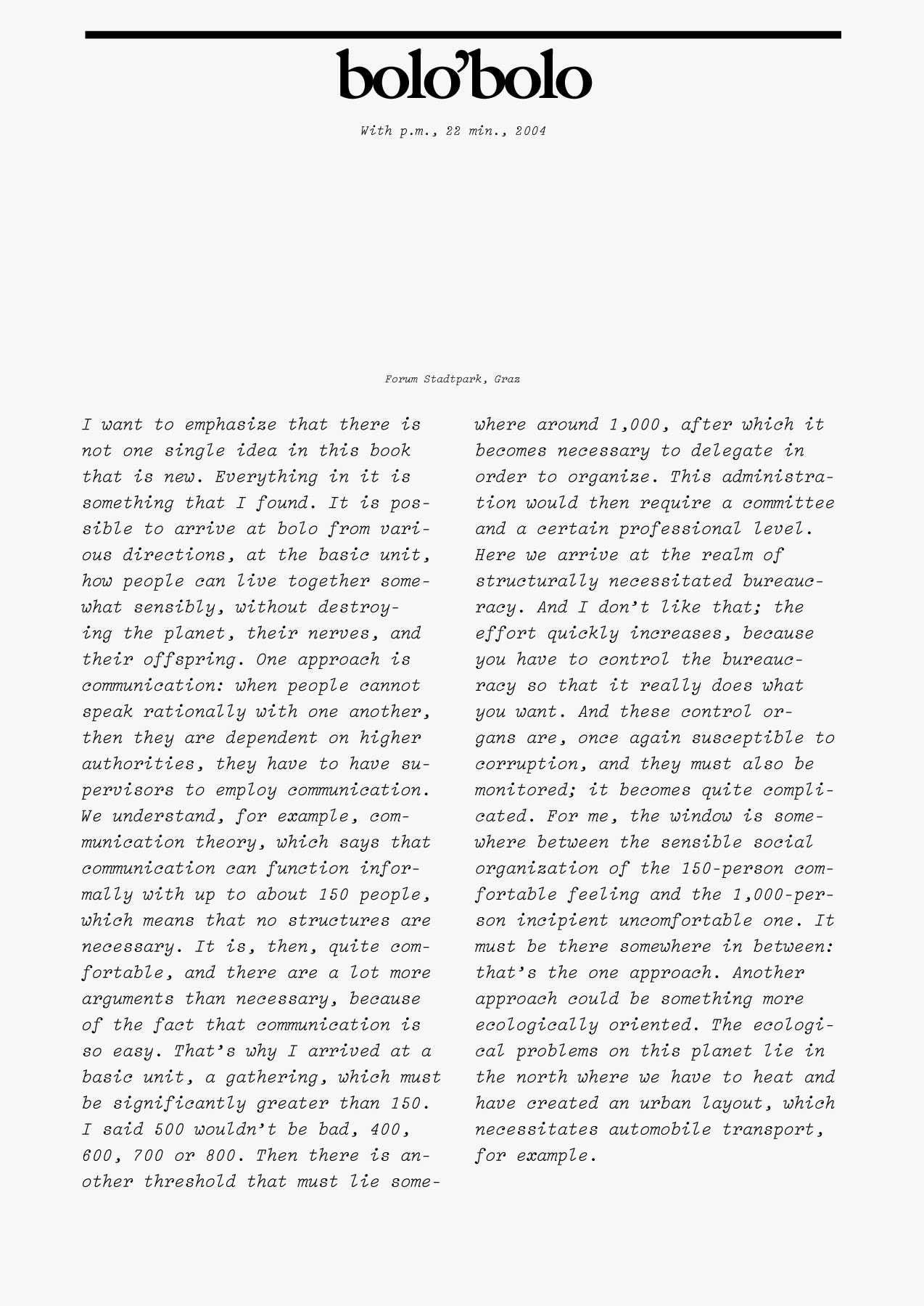
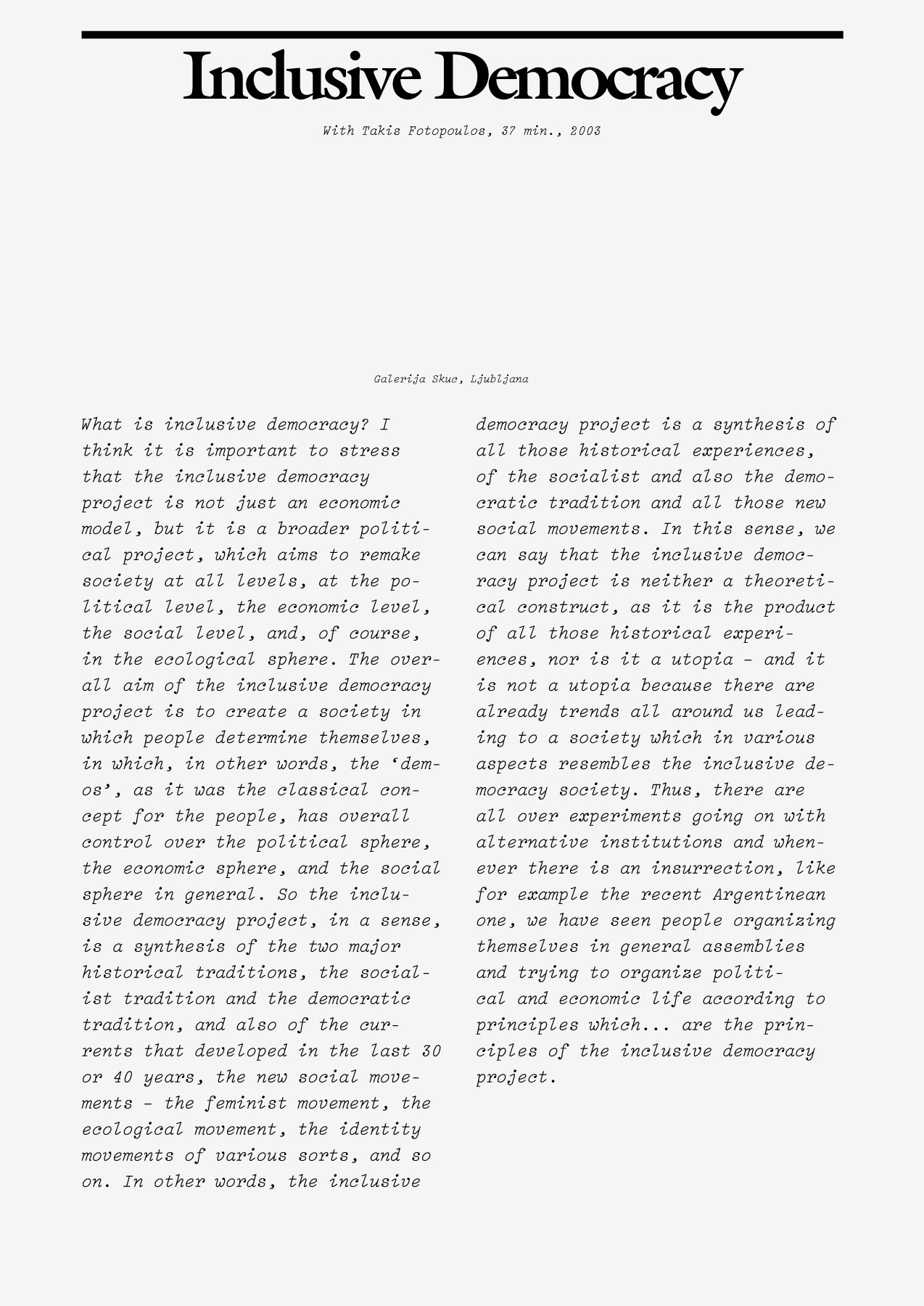
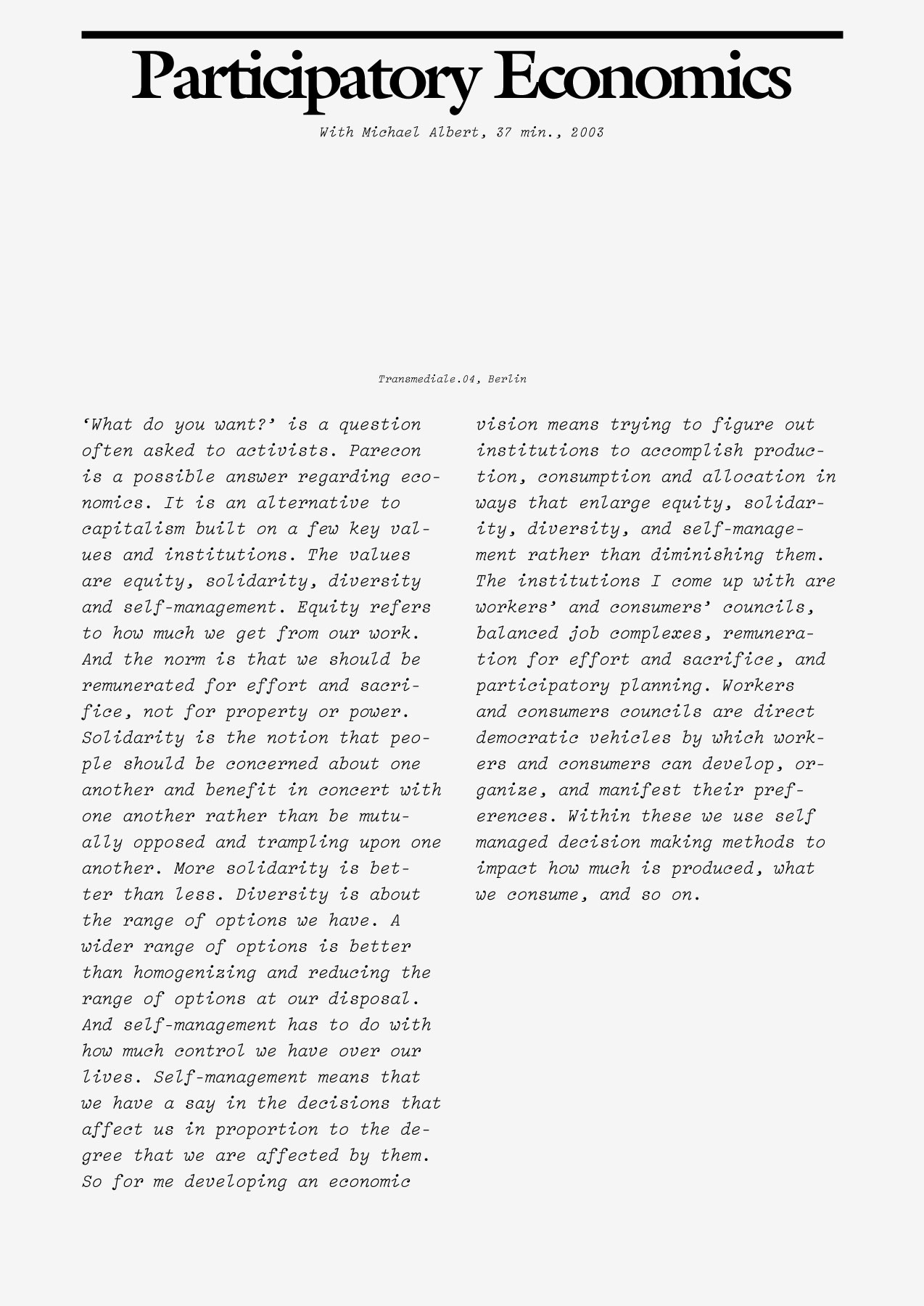
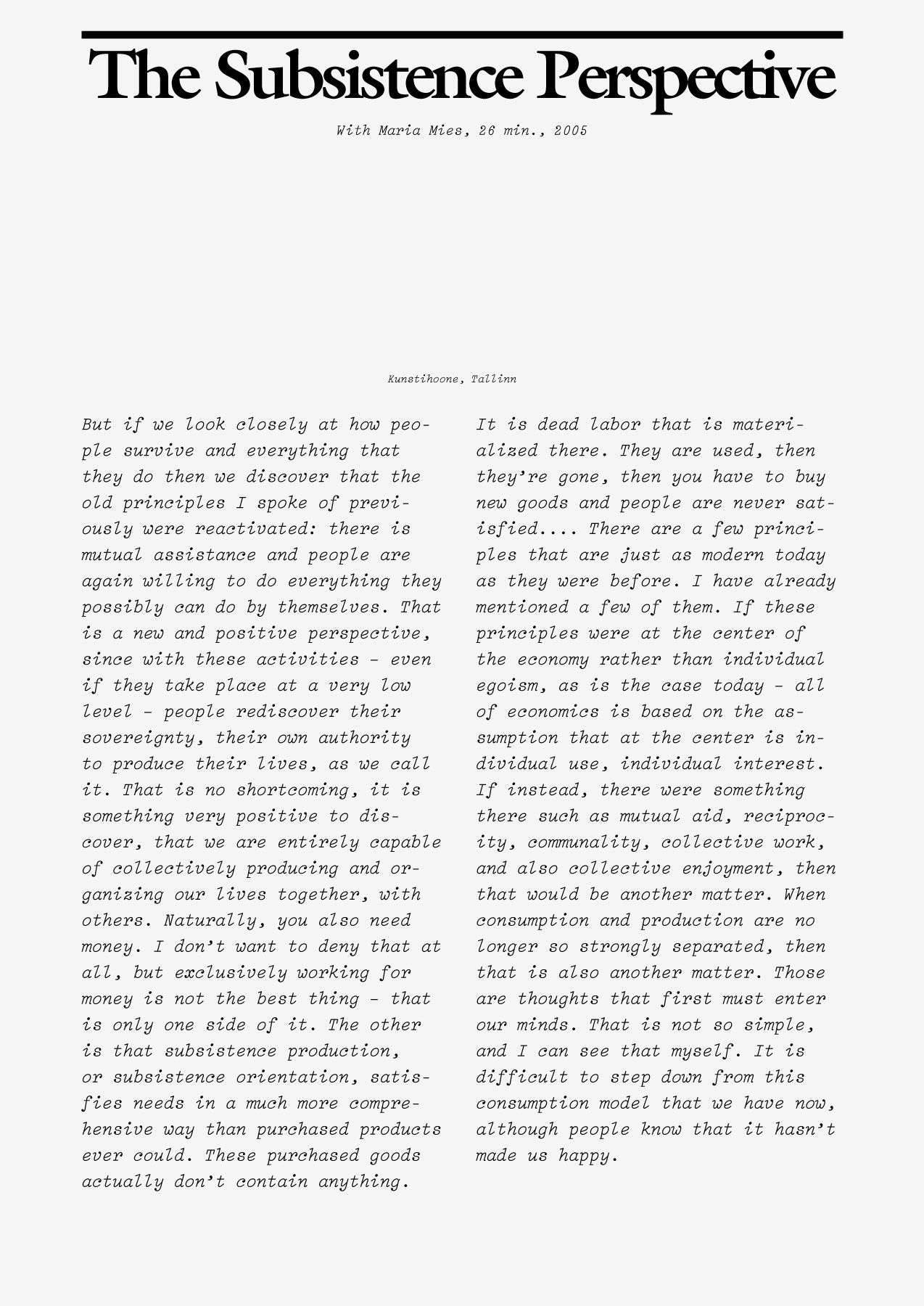
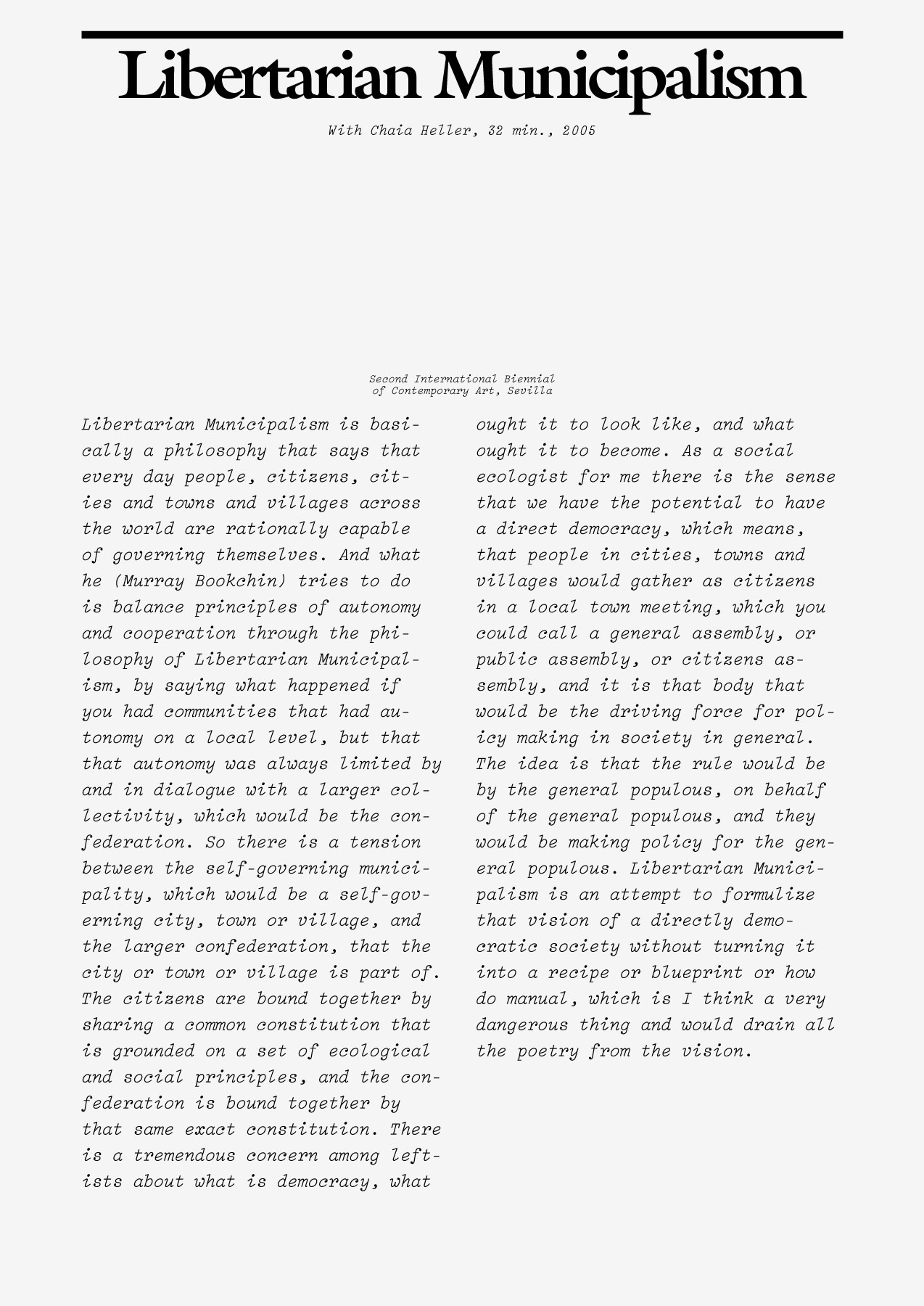
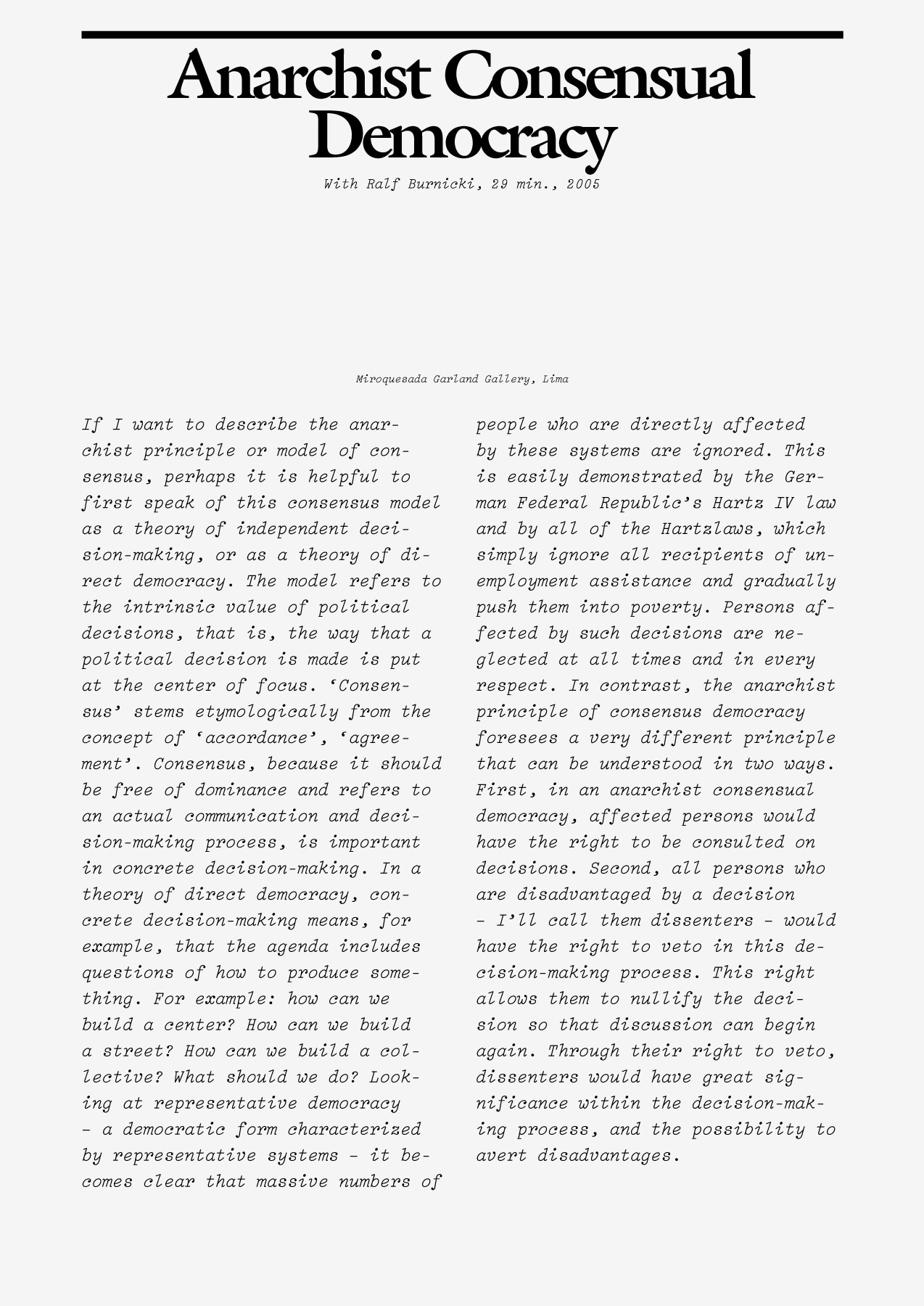
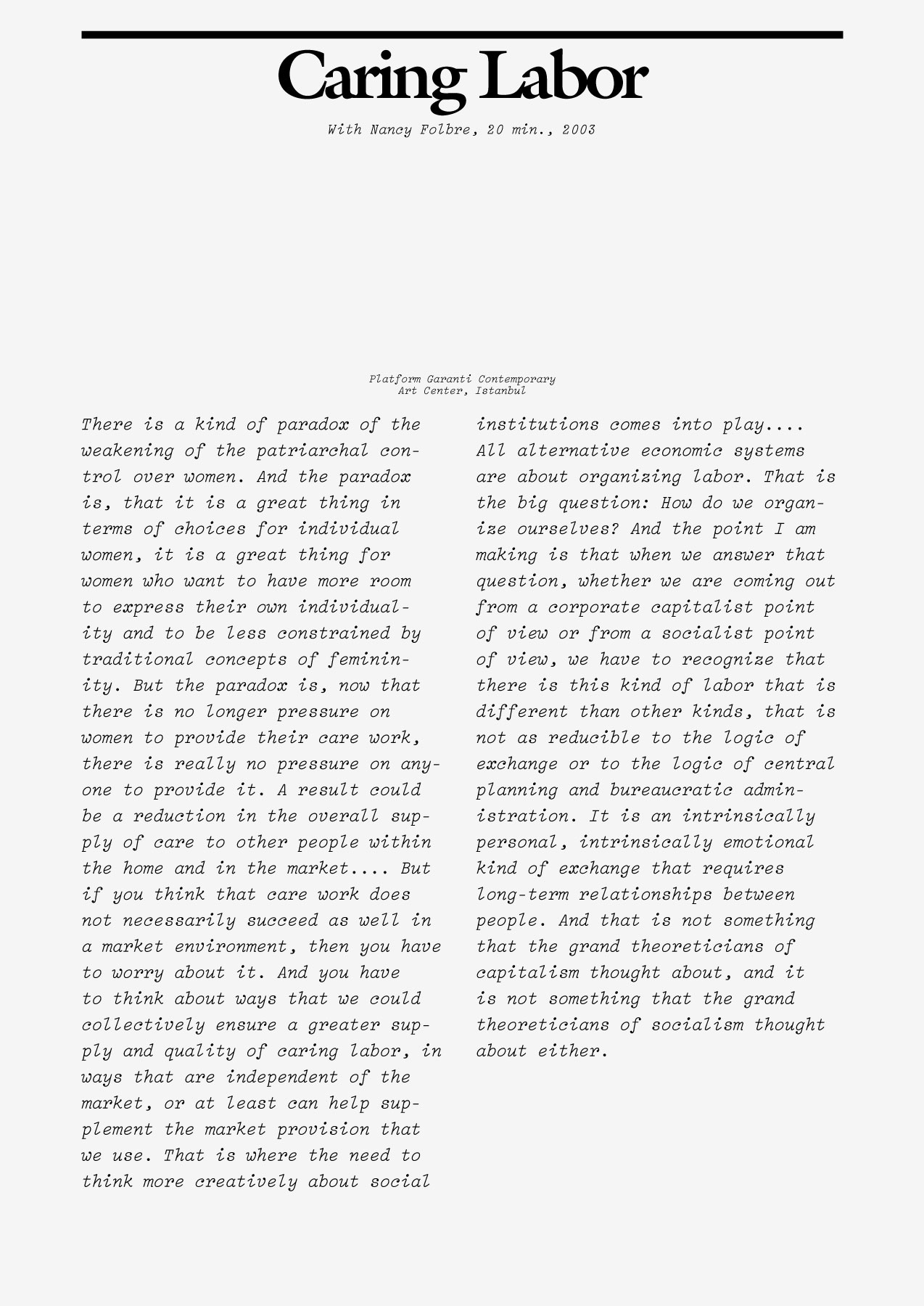
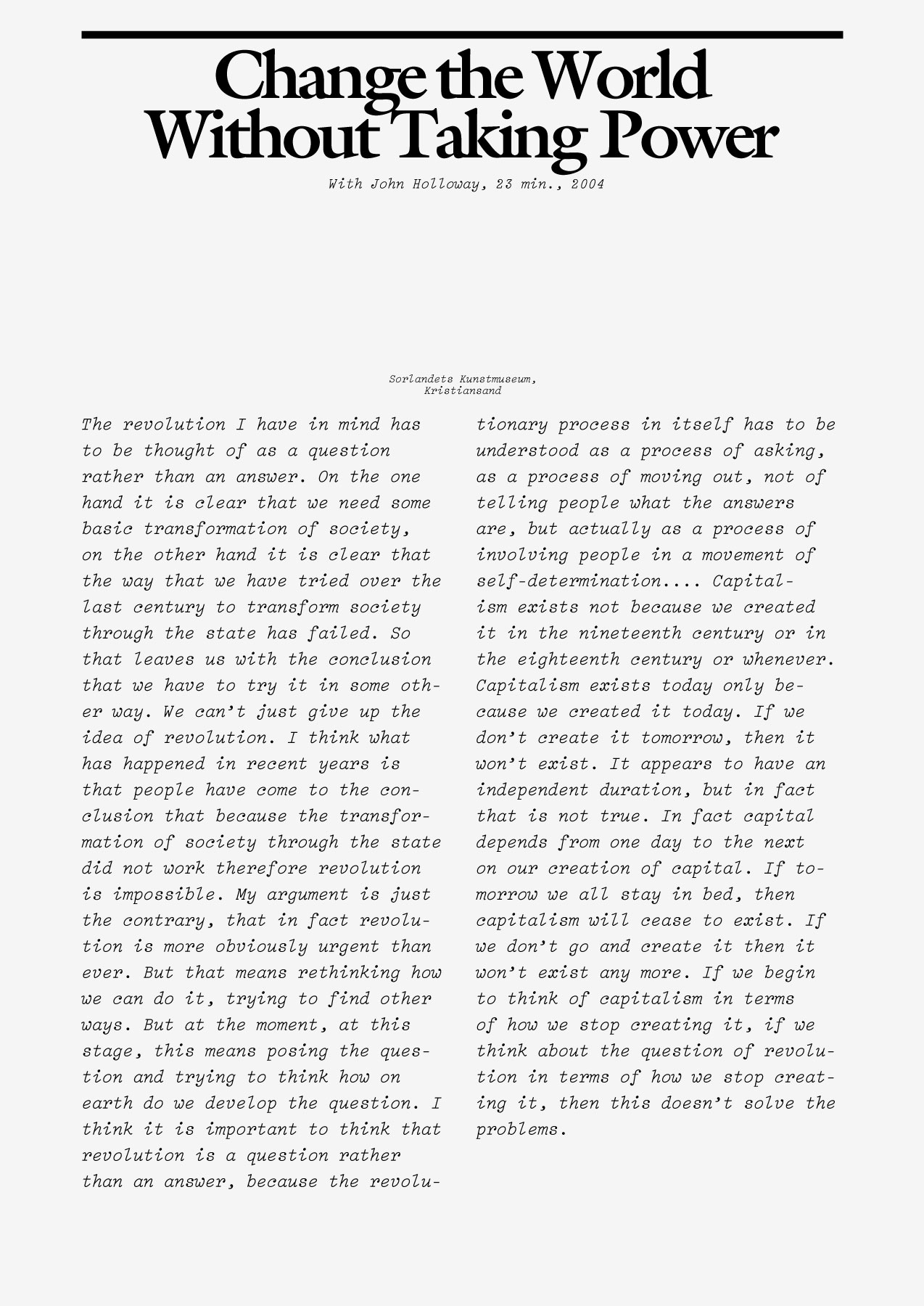
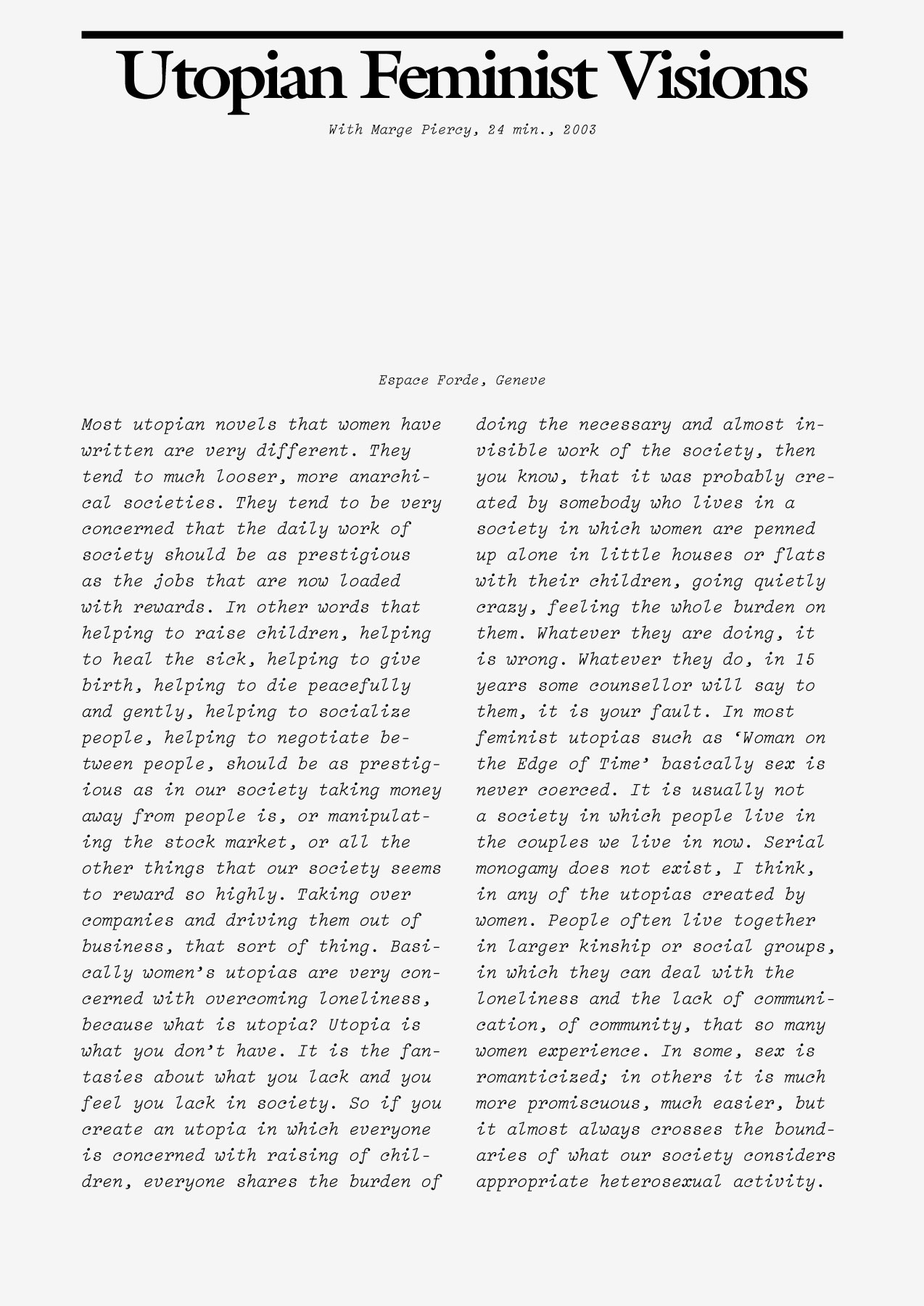
Bolo’Bolo
With p.m., 22 min., 2004
Forum Stadtpark, Graz
I want to emphasize that there is not one single idea in this book that is new. Everything in it is something that I found. It is possible to arrive at bolo from various directions, at the basic unit, how people can live together somewhat sensibly, without destroying the planet, their nerves, and their offspring. One approach is communication: when people cannot speak rationally with one another, then they are dependent on higher authorities, they have to have supervisors to employ communication. We understand, for example, communication theory, which says that communication can function informally with up to about 150 people, which means that no structures are necessary. It is, then, quite comfortable, and there are a lot more arguments than necessary, because of the fact that communication is so easy. That’s why I arrived at a basic unit, a gathering, which must be significantly greater than 150. I said 500 wouldn’t be bad, 400, 600, 700 or 800. Then there is another threshold that must lie somewhere around 1,000, after which it becomes necessary to delegate in order to organize. This administration would then require a committee and a certain professional level. Here we arrive at the realm of structurally necessitated bureaucracy. And I don’t like that; the effort quickly increases, because you have to control the bureaucracy so that it really does what you want. And these control organs are, once again susceptible to corruption, and they must also be monitored; it becomes quite complicated. For me, the window is somewhere between the sensible social organization of the 150-person comfortable feeling and the 1,000-person incipient uncomfortable one. It must be there somewhere in between: that’s the one approach. Another approach could be something more ecologically oriented. The ecological problems on this planet lie in the north where we have to heat and have created an urban layout, which necessitates automobile transport, for example.
Inclusive Democracy
With Takis Fotopoulos, 37 min., 2003
Galerija Skuc, Ljubljana
What is inclusive democracy? I think it is important to stress that the inclusive democracy project is not just an economic model, but it is a broader political project, which aims to remake society at all levels, at the political level, the economic level, the social level, and, of course, in the ecological sphere. The overall aim of the inclusive democracy project is to create a society in which people determine themselves, in which, in other words, the ‘demos’, as it was the classical concept for the people, has overall control over the political sphere, the economic sphere, and the social sphere in general. So the inclusive democracy project, in a sense, is a synthesis of the two major historical traditions, the socialist tradition and the democratic tradition, and also of the currents that developed in the last 30 or 40 years, the new social movements – the feminist movement, the ecological movement, the identity movements of various sorts, and so on. In other words, the inclusive democracy project is a synthesis of all those historical experiences, of the socialist and also the democratic tradition and all those new social movements. In this sense, we can say that the inclusive democracy project is neither a theoretical construct, as it is the product of all those historical experiences, nor is it a utopia – and it is not a utopia because there are already trends all around us leading to a society which in various aspects resembles the inclusive democracy society. Thus, there are all over experiments going on with alternative institutions and whenever there is an insurrection, like for example the recent Argentinean one, we have seen people organizing themselves in general assemblies and trying to organize political and economic life according to principles which... are the principles of the inclusive democracy project.
Participatory Economics
With Michael Albert, 37 min., 2003
Transmediale.04, Berlin
‘What do you want?’ is a question often asked to activists. Parecon is a possible answer regarding economics. It is an alternative to capitalism built on a few key values and institutions. The values are equity, solidarity, diversity and self-management. Equity refers to how much we get from our work. And the norm is that we should be remunerated for effort and sacrifice, not for property or power. Solidarity is the notion that people should be concerned about one another and benefit in concert with one another rather than be mutually opposed and trampling upon one another. More solidarity is better than less. Diversity is about the range of options we have. A wider range of options is better than homogenizing and reducing the range of options at our disposal. And self-management has to do with how much control we have over our lives. Self-management means that we have a say in the decisions that affect us in proportion to the degree that we are affected by them. So for me developing an economic vision means trying to figure out institutions to accomplish production, consumption and allocation in ways that enlarge equity, solidarity, diversity, and self-management rather than diminishing them. The institutions I come up with are workers’ and consumers’ councils, balanced job complexes, remuneration for effort and sacrifice, and participatory planning. Workers and consumers councils are direct democratic vehicles by which workers and consumers can develop, organize, and manifest their preferences. Within these we use self managed decision making methods to impact how much is produced, what we consume, and so on.
The Subsistence Perspective
With Maria Mies, 26 min., 2005
Kunstihoone, Tallinn
But if we look closely at how people survive and everything that they do then we discover that the old principles I spoke of previously were reactivated: there is mutual assistance and people are again willing to do everything they possibly can do by themselves. That is a new and positive perspective, since with these activities – even if they take place at a very low level – people rediscover their sovereignty, their own authority to produce their lives, as we call it. That is no shortcoming, it is something very positive to discover, that we are entirely capable of collectively producing and organizing our lives together, with others. Naturally, you also need money. I don’t want to deny that at all, but exclusively working for money is not the best thing – that is only one side of it. The other is that subsistence production, or subsistence orientation, satisfies needs in a much more comprehensive way than purchased products ever could. These purchased goods actually don’t contain anything. It is dead labor that is materialized there. They are used, then they’re gone, then you have to buy new goods and people are never satisfied.... There are a few principles that are just as modern today as they were before. I have already mentioned a few of them. If these principles were at the center of the economy rather than individual egoism, as is the case today – all of economics is based on the assumption that at the center is individual use, individual interest. If instead, there were something there such as mutual aid, reciprocity, communality, collective work, and also collective enjoyment, then that would be another matter. When consumption and production are no longer so strongly separated, then that is also another matter. Those are thoughts that first must enter our minds. That is not so simple, and I can see that myself. It is difficult to step down from this consumption model that we have now, although people know that it hasn’t made us happy.
Libertarian Municipalism
With Chaia Heller, 32 min., 2005
Second International Biennial of Contemporary Art, Sevilla
Libertarian Municipalism is basically a philosophy that says that every day people, citizens, cities and towns and villages across the world are rationally capable of governing themselves. And what he (Murray Bookchin) tries to do is balance principles of autonomy and cooperation through the philosophy of Libertarian Municipalism, by saying what happened if you had communities that had autonomy on a local level, but that that autonomy was always limited by and in dialogue with a larger collectivity, which would be the confederation. So there is a tension between the self-governing municipality, which would be a self-governing city, town or village, and the larger confederation, that the city or town or village is part of. The citizens are bound together by sharing a common constitution that is grounded on a set of ecological and social principles, and the confederation is bound together by that same exact constitution. There is a tremendous concern among leftists about what is democracy, what ought it to look like, and what ought it to become. As a social ecologist for me there is the sense that we have the potential to have a direct democracy, which means, that people in cities, towns and villages would gather as citizens in a local town meeting, which you could call a general assembly, or public assembly, or citizens assembly, and it is that body that would be the driving force for policy making in society in general. The idea is that the rule would be by the general populous, on behalf of the general populous, and they would be making policy for the general populous. Libertarian Municipalism is an attempt to formulize that vision of a directly democratic society without turning it into a recipe or blueprint or how do manual, which is I think a very dangerous thing and would drain all the poetry from the vision.
Anarchist Consensual
Democracy
With Ralf Burnicki, 29 min., 2005
Miroquesada Garland Gallery, Lima
If I want to describe the anarchist principle or model of consensus, perhaps it is helpful to first speak of this consensus model as a theory of independent decision-making, or as a theory of direct democracy. The model refers to the intrinsic value of political decisions, that is, the way that a political decision is made is put at the center of focus. ‘Consensus’ stems etymologically from the concept of ‘accordance’, ‘agreement’. Consensus, because it should be free of dominance and refers to an actual communication and decision-making process, is important in concrete decision-making. In a theory of direct democracy, concrete decision-making means, for example, that the agenda includes questions of how to produce something. For example: how can we build a center? How can we build a street? How can we build a collective? What should we do? Looking at representative democracy – a democratic form characterized by representative systems – it becomes clear that massive numbers of people who are directly affected by these systems are ignored. This is easily demonstrated by the German Federal Republic’s Hartz IV law and by all of the Hartzlaws, which simply ignore all recipients of unemployment assistance and gradually push them into poverty. Persons affected by such decisions are neglected at all times and in every respect. In contrast, the anarchist principle of consensus democracy foresees a very different principle that can be understood in two ways. First, in an anarchist consensual democracy, affected persons would have the right to be consulted on decisions. Second, all persons who are disadvantaged by a decision – I’ll call them dissenters – would have the right to veto in this decision-making process. This right allows them to nullify the decision so that discussion can begin again. Through their right to veto, dissenters would have great significance within the decision-making process, and the possibility to avert disadvantages.
Caring Labor
With Nancy Folbre, 20 min., 2003
Platform Garanti Contemporary
Art Center, Istanbul
There is a kind of paradox of the weakening of the patriarchal control over women. And the paradox is, that it is a great thing in terms of choices for individual women, it is a great thing for women who want to have more room to express their own individuality and to be less constrained by traditional concepts of femininity. But the paradox is, now that there is no longer pressure on women to provide their care work, there is really no pressure on anyone to provide it. A result could be a reduction in the overall supply of care to other people within the home and in the market.... But if you think that care work does not necessarily succeed as well in a market environment, then you have to worry about it. And you have to think about ways that we could collectively ensure a greater supply and quality of caring labor, in ways that are independent of the market, or at least can help supplement the market provision that we use. That is where the need to think more creatively about social institutions comes into play.... All alternative economic systems are about organizing labor. That is the big question: How do we organize ourselves? And the point I am making is that when we answer that question, whether we are coming out from a corporate capitalist point of view or from a socialist point of view, we have to recognize that there is this kind of labor that is different than other kinds, that is not as reducible to the logic of exchange or to the logic of central planning and bureaucratic administration. It is an intrinsically personal, intrinsically emotional kind of exchange that requires long-term relationships between people. And that is not something that the grand theoreticians of capitalism thought about, and it is not something that the grand theoreticians of socialism thought about either.
Change the World WithoutTaking Power
With John Holloway, 23 min., 2004
Sorlandets Kunstmuseum,
Kristiansand
The revolution I have in mind has to be thought of as a question rather than an answer. On the one hand it is clear that we need some basic transformation of society, on the other hand it is clear that the way that we have tried over the last century to transform society through the state has failed. So that leaves us with the conclusion that we have to try it in some other way. We can’t just give up the idea of revolution. I think what has happened in recent years is that people have come to the conclusion that because the transformation of society through the state did not work therefore revolution is impossible. My argument is just the contrary, that in fact revolution is more obviously urgent than ever. But that means rethinking how we can do it, trying to find other ways. But at the moment, at this stage, this means posing the question and trying to think how on earth do we develop the question. I think it is important to think that revolution is a question rather than an answer, because the revolutionary process in itself has to be understood as a process of asking, as a process of moving out, not of telling people what the answers are, but actually as a process of involving people in a movement of self-determination.... Capitalism exists not because we created it in the nineteenth century or in the eighteenth century or whenever. Capitalism exists today only because we created it today. If we don’t create it tomorrow, then it won’t exist. It appears to have an independent duration, but in fact that is not true. In fact capital depends from one day to the next on our creation of capital. If tomorrow we all stay in bed, then capitalism will cease to exist. If we don’t go and create it then it won’t exist any more. If we begin to think of capitalism in terms of how we stop creating it, if we think about the question of revolution in terms of how we stop creating it, then this doesn’t solve the problems.
Utopian Feminist Visions
With Marge Piercy, 24 min., 2003
Espace Forde, Genève
Most utopian novels that women have written are very different. They tend to much looser, more anarchical societies. They tend to be very concerned that the daily work of society should be as prestigious as the jobs that are now loaded with rewards. In other words that helping to raise children, helping to heal the sick, helping to give birth, helping to die peacefully and gently, helping to socialize people, helping to negotiate between people, should be as prestigious as in our society taking money away from people is, or manipulating the stock market, or all the other things that our society seems to reward so highly. Taking over companies and driving them out of business, that sort of thing. Basically women’s utopias are very concerned with overcoming loneliness, because what is utopia? Utopia is what you don’t have. It is the fantasies about what you lack and you feel you lack in society. So if you create an utopia in which everyone is concerned with raising of children, everyone shares the burden of doing the necessary and almost invisible work of the society, then you know, that it was probably created by somebody who lives in a society in which women are penned up alone in little houses or flats with their children, going quietly crazy, feeling the whole burden on them. Whatever they are doing, it is wrong. Whatever they do, in 15 years some counsellor will say to them, it is your fault. In most feminist utopias such as ‘Woman on the Edge of Time’ basically sex is never coerced. It is usually not a society in which people live in the couples we live in now. Serial monogamy does not exist, I think, in any of the utopias created by women. People often live together in larger kinship or social groups, in which they can deal with the loneliness and the lack of communication, of community, that so many women experience. In some, sex is romanticized; in others it is much more promiscuous, much easier, but it almost always crosses the boundaries of what our society considers appropriate heterosexual activity.
Oliver Ressler (AT) is a graphic artist. Since 2003 he has been working on the project Alternative Economics, Alternative Societies. See further: www.ressler.at.